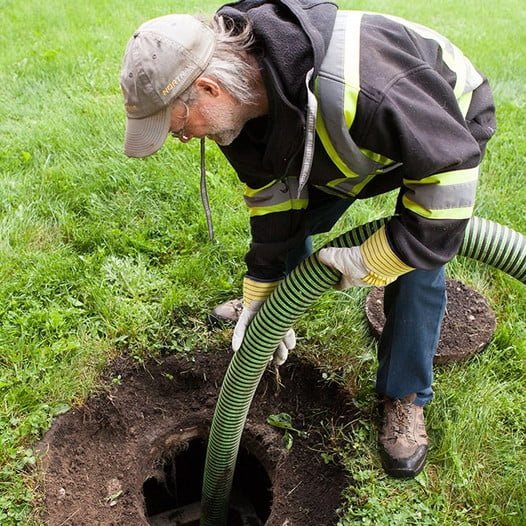A septic tank system is an underground wastewater treatment system commonly used in rural areas without access to a centralized sewer system. It consists of a large tank that collects and treats the wastewater from a household or building. The tank is typically made of concrete, fiberglass, or plastic and is buried underground.
Proper maintenance of septic tank systems is crucial to ensure their longevity and functionality. Neglecting regular maintenance can lead to costly repairs, environmental contamination, and health hazards. Regular pumping is essential to septic tank maintenance, as it removes the accumulated solids and prevents them from clogging the system.

Key Takeaways
- Septic tank systems are an important part of a home’s wastewater management system.
- Regular pumping is crucial to maintaining the health and functionality of your septic system.
- Signs that your septic system needs pumping include slow drains, foul odors, and sewage backups.
- Septic tank pumping frequency depends on household size and water usage.
- Professional septic tank pumping services can ensure a safe and effective pumping process.
Understanding the Importance of Regular Pumping
Regular pumping is vital for septic tank systems because it helps prevent the buildup of solids that can clog the system and cause it to fail. Over time, solid waste and sludge accumulate at the bottom of the tank, while lighter materials like grease and oils float to the top. The middle layer, or effluent, flows out of the tank into the drain field.
If the solids are not pumped out regularly, they can build up and reduce the tank’s effective capacity. This can lead to backups, slow drains, foul odors, and even sewage overflow onto your property. Additionally, solids entering the drain field can clog the soil and prevent proper wastewater absorption.

SEPTIFIX will save you hundreds, if not thousands of dollars each year, because your septic system will run smoothly and you won’t have to worry about calling the pumpers or a plumber for a fix!
Click here to save up to 50%
Signs That Your Septic System Needs Pumping
Several signs indicate that your septic system needs pumping. Addressing these signs promptly can prevent further damage to your system and avoid potential health hazards.
One common sign is slow drains or toilets that are slow to flush. If you notice water draining slowly from sinks, showers, or toilets, it may be a sign that your septic tank is full and needs pumping.
Another sign is foul odors coming from your drains or yard. If you detect a strong sewage smell inside your home or near the septic tank area, it could indicate that the tank is full and needs to be pumped.
Gurgling sounds coming from your plumbing fixtures can also be a sign of a full septic tank. These sounds occur when air is trapped in the plumbing system due to a backup caused by a full tank.
How Often Should You Pump Your Septic Tank?
| Household Size | Septic Tank Size | Pumping Frequency |
|---|---|---|
| 1-2 people | 750-900 gallons | Every 3-5 years |
| 3-4 people | 1,000-1,200 gallons | Every 3-5 years |
| 5 or more people | 1,500-2,000 gallons | Every 1-3 years |
The frequency at which you should pump your septic tank depends on several factors, including the size of the tank, the number of people in your household, and your water usage habits. As a general guideline, pumping your septic tank every 3-5 years is recommended.
If you have a smaller tank or a larger household with more people, you may need to pump more frequently. On the other hand, if you have a larger tank or a smaller household, you may be able to go longer between pumpings.
It’s important to note that these are just general guidelines. It’s best to consult a professional septic tank pumping service to determine the optimal pumping frequency for your specific situation.
The Pumping Process: What to Expect
Several steps are involved when you schedule a septic tank pumping service. Here is a step-by-step explanation of what to expect during and after pumping:
1. Inspection: The pumping service will start by inspecting the septic tank and its components to ensure everything works. They will check for any signs of damage or leaks that must be addressed.
2. Pumping: The service will begin pumping once the inspection is complete. They will use specialized equipment, such as a vacuum truck, to remove the solids and sludge from the tank. The wastewater will be transported to a treatment facility for proper disposal.
3. Cleaning: After the tank is pumped, the pumping service will clean the tank to remove any remaining residue or debris. This helps ensure that the tank is thoroughly cleaned and ready for use.

SEPTIFIX will save you hundreds, if not thousands of dollars each year, because your septic system will run smoothly and you won’t have to worry about calling the pumpers or a plumber for a fix!
Click here to save up to 50%
4. Inspection and Maintenance Recommendations: Once the pumping and cleaning are complete, the pumping service will conduct a final inspection to ensure everything is in proper working order. They may also provide recommendations for any necessary repairs or maintenance to prolong the lifespan of your septic system.
Choosing a Professional Septic Tank Pumping Service
When choosing a professional septic tank pumping service, several factors must be considered to ensure you are hiring a reputable and experienced service provider.
First, it’s important to choose a licensed and insured company. This ensures they have met the requirements and the proper training and expertise to perform septic tank pumping safely and effectively.
It’s also good to ask for references or read online reviews to understand the company’s reputation and customer satisfaction. A reliable pumping service should have positive reviews and be willing to provide references upon request.
Additionally, the equipment and technology used by the pumping service must be considered. Look for a company that uses modern equipment and techniques to ensure efficient and thorough pumping.
DIY Septic Tank Pumping: Is it Safe?
While it may be tempting to attempt DIY septic tank pumping to save money, it is not recommended due to the risks and dangers involved.
Septic tanks contain hazardous materials, including bacteria, viruses, and toxic gases. Without proper training and equipment, DIY pumping can expose you to these hazards, risking your health.
Furthermore, DIY pumping may not be as effective as professional pumping. Professionals have specialized equipment that allows them to clean the tank and thoroughly remove all solids and sludge. Attempting DIY pumping may result in incomplete waste removal, leading to future problems with your septic system.
It’s best to leave septic tank pumping to professionals with the knowledge, experience, and equipment to do the job safely and effectively.
Preventive Maintenance Tips for Your Septic System
To prevent problems and prolong the lifespan of your septic system, it’s important to follow these preventive maintenance tips:
1. Conserve water: Excessive water usage can overload your septic system and lead to premature failure. Be mindful of water usage and avoid wastewater activities, such as running the dishwasher or washing machine with partial loads.
2. Avoid flushing non-biodegradable items: Only flush toilet paper and human waste down the toilet. Avoid flushing diapers, feminine hygiene products, wipes, and paper towels, as they can clog your septic system.
3. Be mindful of what goes down the drain: Avoid pouring grease, oils, chemicals, or harsh cleaning products down the drain. These substances can disrupt the natural bacteria in your septic tank and cause damage.
4. Schedule regular inspections and maintenance: Regular inspections by a professional septic service can help identify any potential issues before they become major problems. They can also recommend maintenance tasks, such as pumping or repairs.
Common Septic Tank Problems and How to Avoid Them
Several common septic tank problems can be avoided through proper maintenance and care.
One common problem is a clogged drain field. This can occur when solids from the septic tank enter the drain field and clog the soil, preventing proper wastewater absorption. To avoid this problem, it’s important to have your septic tank pumped regularly to remove solids before they reach the drain field.
Another common problem is a leak or damage to the septic tank or its components. Regular inspections can help identify any signs of damage early on so that repairs can be made promptly.
Additionally, excessive water usage can overload your septic system and lead to failure. By conserving water and being mindful of your usage, you can prevent this problem and prolong the lifespan of your septic system.
The Benefits of Regular Septic Tank Pumping
In conclusion, regular septic tank pumping is essential for maintaining a healthy and functioning septic system. Neglecting regular pumping can lead to costly repairs, environmental contamination, and health hazards.

SEPTIFIX will save you hundreds, if not thousands of dollars each year, because your septic system will run smoothly and you won’t have to worry about calling the pumpers or a plumber for a fix!
Click here to save up to 50%
Properly addressing the signs that your septic system needs pumping can prevent further damage and avoid potential health hazards.
It’s important to consult with a professional septic tank pumping service to determine the optimal pumping frequency for your specific situation. They can also provide recommendations for preventive maintenance tasks to prolong the lifespan of your septic system.
By following preventive maintenance tips and addressing any potential issues promptly, you can ensure a healthy and functioning septic system for years to come. Schedule regular pumping and maintenance to keep your septic system in optimal condition.
If you require septic pumping services, it’s important to consider the maintenance and cleaning of your septic tank. Regular cleaning helps prevent clogs and ensures the proper functioning of your system. In fact, a recent article on MySepticTank.com highlights the importance of septic tank cleaning in Jacksonville, FL. The article provides valuable insights into the benefits of regular cleaning and offers tips on finding reliable professionals for septic tank cleaning in Miami and Biddeford, ME. To learn more about the significance of septic tank cleaning, check out the article here.
FAQs
What is septic pumping?
Septic pumping is the process of removing solid waste and sludge from a septic tank. This prevents the tank from overflowing and damaging the environment.

SEPTIFIX will save you hundreds, if not thousands of dollars each year, because your septic system will run smoothly and you won’t have to worry about calling the pumpers or a plumber for a fix!
Click here to save up to 50%
How often should septic pumping be done?
Septic pumping should be done every 3-5 years, depending on the size of the tank and the number of people using it. Regular pumping helps maintain the septic system’s health and longevity.
What are the signs that a septic tank needs to be pumped?
Some signs that a septic tank needs to be pumped include slow-draining sinks and toilets, foul odors coming from the drains, and sewage backups in the home. If you notice any of these signs, it is important to have your septic tank pumped as soon as possible.
Can I pump my own septic tank?
It is not recommended to pump your own septic tank. This job should be left to professionals with the proper equipment and training to do the job safely and effectively.
What happens if a septic tank is not pumped?
If a septic tank is not pumped regularly, the solid waste and sludge can build up and cause the tank to overflow. This can lead to sewage backups in the home, damage to the septic system, and contamination of the environment. Having your septic tank pumped regularly is important to prevent these issues.


